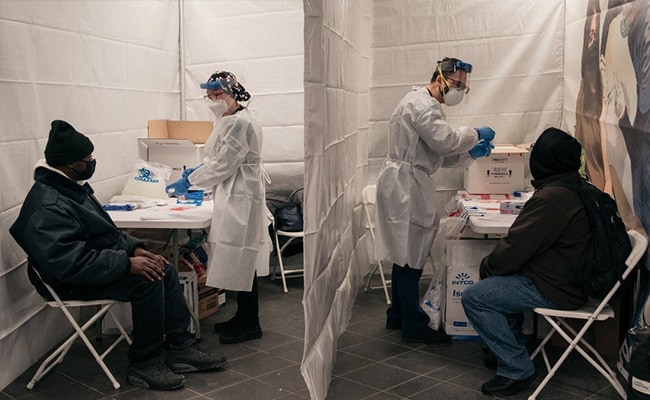
As an Omicron subvariant fuels an alarming wave of infections in China, another sublineage of this strain has put the US on edge: XBB 1.5. The first case linked to this subvariant was detected in India on Friday.
XBB is a hybrid of two different Omicron BA.2 subvariants. While scientists are still in the early stages of studying the XBB subvariant, they said that an even newer version of that subvariant had emerged, known as XBB.1.5.
According to Yunlong Cao, biochemist at Peking University, while XBB.1.5 is not more immune evasive than XBB it does have a higher level of transmissibility. "XBB.1.5 appears faster and more sustained than any of the variants since Omicron's first wave[BA.1] last January," scientist JP Weiland said.
XBB.1.5 was aptly first noted by JP Weiland a couple of weeks ago. While this was coincident with the beginning of a steep rise of hospitalizations there, it is not known for sure how much of this is being driven by XBB.1.5.
In October, Yunlong Cao and his colleagues reported that XBB and three other subvariants had become entirely resistant to the antibodies in blood samples from people who were vaccinated or had Covid infections, New York Times reported.
While updated Covid booster shots, which target the original variant of the coronavirus as well as BA.4 and BA.5 subvariants, would provide some protection against the XBB subvariant, it would not be "optimal", top US infectious diseases expert Anthony Fauci had said in November.
XBB appeared exceptionally agile at evading the antibodies that are created by prior infection or vaccination and that form the body's first line of defense against the virus, Dr Fauci had said. However, Dr. Fauci said he and others were encouraged by data showing that countries like Singapore where XBB led to a jump in infections did not report a commensurate rise in hospitalizations.
"Anytime a new variant moves to a different geographic area, it does run the risk of sort of spawning a mini-outbreak in that area," Andrew Pekosz, a virologist at the Johns Hopkins Bloomberg School of Public Health in Baltimore told Reuters. However, Pekosz said that he does not see the XBB subvariant driving the kind of massive surges seen last winter from the original Omicron variant.
In October, the WHO had said that the XBB subvariant has a global prevalence of 1.3% and it has been detected in 35 countries. WHO's Technical Advisory Group on SARS-CoV-2 Virus Evolution had found early evidence pointing at a higher reinfection risk, as compared to other circulating Omicron sublineages. However, cases of reinfection were primarily limited to those with initial infection in the pre-Omicron period.
Whether the increased immune escape of XBB is sufficient to drive new infection waves appears to depend on the regional immune landscape as affected by the size and timing of previous Omicron waves, the WHO said, as well as the COVID-19 vaccination coverage.
The US Center for Disease Control and Prevention estimated last week that the XBB subvariant has grown to account for nearly a fifth of cases in the country, up from only 3 percent of cases a month earlier. In the week ended December 24, XBB was estimated to account for 18.3% of the COVID-19 cases in the United States, up from 11.2% in the previous week, according to the on Friday (CDC).

